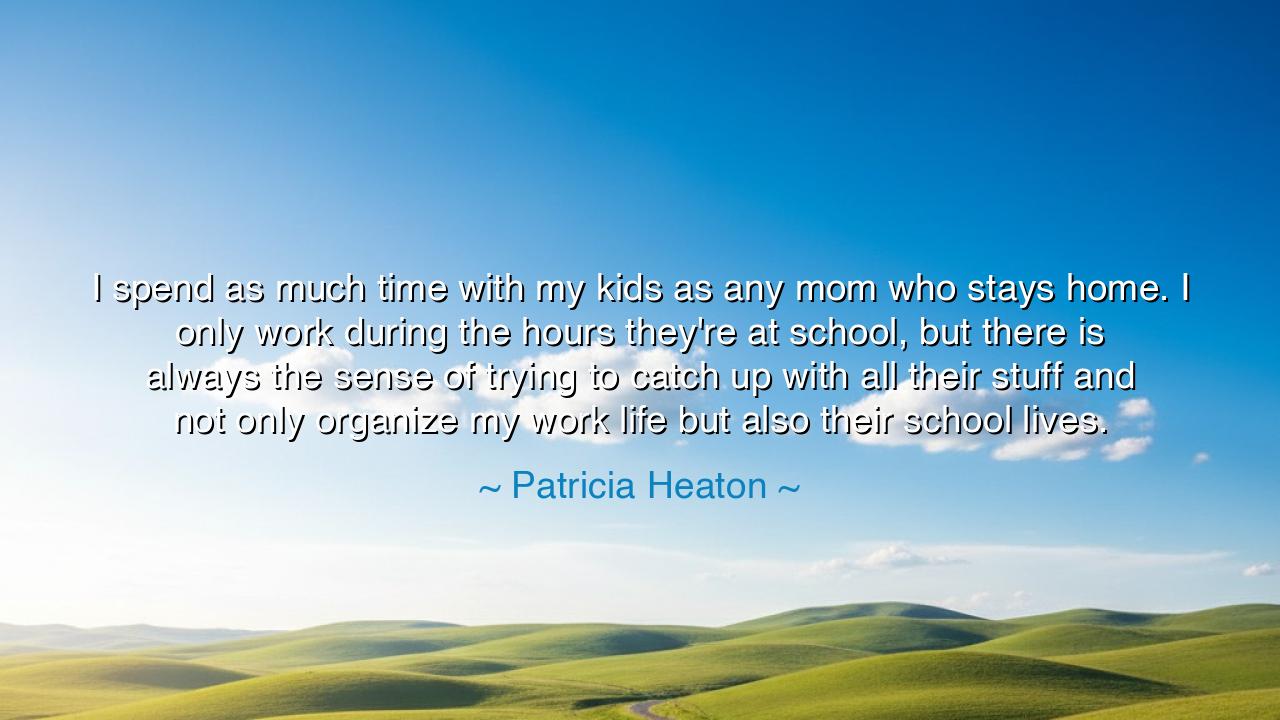
I spend as much time with my kids as any mom who stays home. I
I spend as much time with my kids as any mom who stays home. I only work during the hours they're at school, but there is always the sense of trying to catch up with all their stuff and not only organize my work life but also their school lives.






“I spend as much time with my kids as any mom who stays home. I only work during the hours they’re at school, but there is always the sense of trying to catch up with all their stuff and not only organize my work life but also their school lives.” — thus spoke Patricia Heaton, and in her words we hear the eternal struggle of balance, the battle waged by countless parents who strive to give both to their craft and to their children, both to the call of labor and to the sacred duty of nurture.
The mom in Heaton’s reflection stands at the crossroads of two worlds. One is the world of work, with its demands, its duties, its ceaseless calls for attention. The other is the world of the kids, filled with schoolwork, activities, growth, and the endless need for guidance and love. To live in both worlds is to carry a double burden, to feel always the weight of catching up, always the pull of being in two places at once. This tension is not weakness, but the sign of devotion: the refusal to abandon either calling.
The origin of this struggle is as old as humanity itself. Since the beginning of households and villages, parents have divided their time between labor in the fields and care within the home. The harvest could not wait, yet neither could the child’s hunger. In modern times, this ancient dilemma has only shifted shape: offices have replaced fields, schools have replaced hearthside lessons, but the core tension remains unchanged. Heaton’s voice is the modern echo of an ageless truth—parents live always in the balance between provision and presence.
Consider the story of Cornelia, Mother of the Gracchi, in ancient Rome. She was famed for her wisdom and her devotion to her children. When wealthy women displayed their jewels, Cornelia pointed to her sons and declared, “These are my treasures.” Yet she also managed estates, corresponded with scholars, and guided her sons’ education in both civic and moral duty. Like Heaton, she knew the balance of roles was not perfect—it was a constant weaving, a life lived with both pride and exhaustion. But from her labor came sons who would one day shape the Roman Republic.
The sadness in Heaton’s words is the confession of never feeling fully complete in either role: the sense that there is always more to do, always some detail slipping away, always some corner of life left disordered. Yet this very imperfection is the mark of love. For only the one who cares deeply feels the constant pull of “not enough.” Those indifferent to their children or to their craft are not haunted by catching up—they are simply absent. To feel the tension is to prove one’s devotion.
The lesson for us is clear: do not mistake balance for perfection. Balance is not the stillness of a statue but the motion of a dancer, always leaning, always shifting, always moving to hold many things at once. The parent who seeks to give to both their children and their work will never feel finished, but this is not failure. It is the sign of a life poured out with love and diligence.
Practical action follows: when you feel the weight of roles pulling at you, do not despair. Instead, pause to honor what you have already given. Organize where you can, but do not let the chaos blind you to the love at the center. Speak openly with your family about your struggles, and let them see not only your strength but your humanity. And when exhaustion comes, remember that children do not measure perfection—they remember presence, affection, and the spirit with which you lived among them.
Thus Patricia Heaton’s words endure as both lament and encouragement. The mom who labors in the hours of work and then races to catch up at home is not failing, but walking the ancient path of all who love greatly. It is a heroic path, filled with imperfection, yet radiant with devotion. And so must we all learn: the measure of a parent is not the flawless organization of life, but the love that endures through the chaos.






AAdministratorAdministrator
Welcome, honored guests. Please leave a comment, we will respond soon